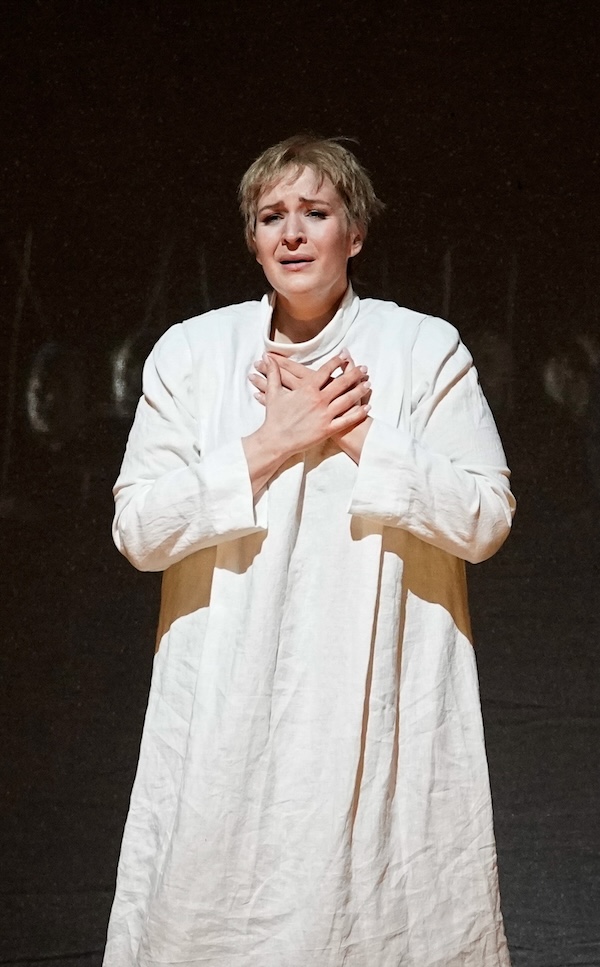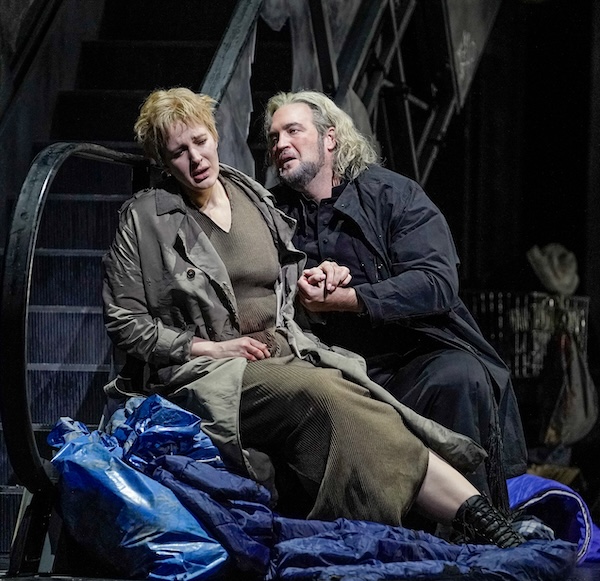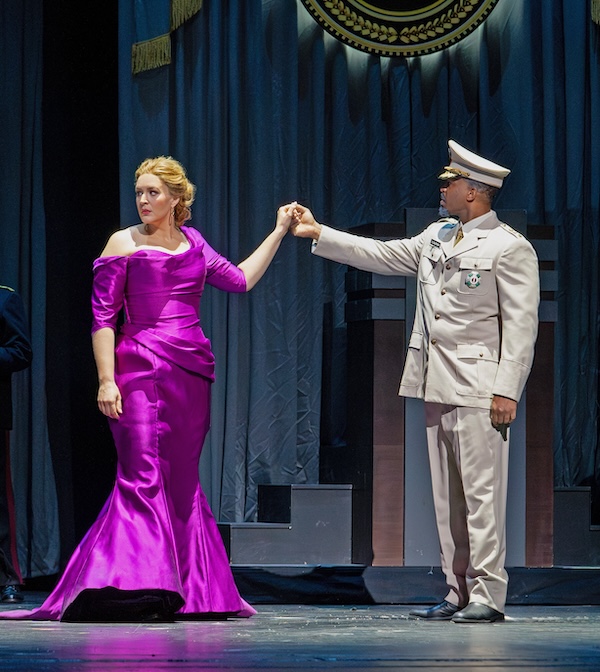Davidsen is the Leonora of a lifetime in the Met’s bleak, wartime “La Forza”

Overwhelmed by the ovation which she received for a stunning “Pace, pace, mio Dio!,” Lise Davidsen flashed a brief smile and then quickly and contritely dropped her head to her chest Monday night. This momentary break in character in her triumphant performance of Leonora in Verdi’s La forza del destino at the Metropolitan Opera only endeared her more to the audience; conductor Yannick Nézet-Séguin led the applause to even greater heights.
The musical success of the performance did not rest solely on Davidsen, however, as the Met assembled a fine cast, down to the pivotal supporting roles, for the Met premiere of Mariusz Treliński’s production. Tenor Brian Jagde as Leonora’s frustrated lover Don Alvaro and baritone Igor Golovatenko as her vengeful brother Don Carlo gave powerful performances that all but equalled that of Davidsen. The Met forces too were in top form with Nézet-Séguin leading the chorus and orchestra in a thrilling performance that captured all of the energy and drama which Verdi instilled in the score.
This was the Met’s first new production of Verdi’s opera in nearly 30 years. Presented at Teatr Wielki—Polish National Opera last year, Treliński updates the action the present day. He attempts to impose coherency on the opera’s sprawling plot by providing a backstory of sorts centering on Leonora’s father, the Marquis of Calatrava. There is no doubt as to where the action is taking place, as the location of each scene is projected on a scrim.
Treliński superimposes on the already complex narrative the collapse of a civilized society. In the glitzy Hotel Calatrava, where the first act is set, the Marquis and his cronies celebrate the glory of war against the backdrop of a corrosive nationalism. The monastery of the Madonna of Angels where Leonora seeks refuge is similarly sleek and modern where compassion is meted out begrudgingly.
The wartime scenes which follow are bleak. Chainlink fences topped by razor wire encase rows of tents which are later replaced by the soldiers’ grave marked by their guns and helmets. Wounded and disabled soldiers are treated to a somewhat macabre performance by Preziosilla and her troupe of showgirls wearing masks with long upright ears.
More horrific is the aftermath of war, with the final act set in a bombed out subway station where the homeless gather for food. Alvaro is one of the monks attempting to minister to their needs. Leonora appears on stage pushing a shopping cart containing her few belongings. It’s a harrowing scene made all the more so by Davidsen’s haunting appearance.

Each scene is preceded by video which established the mood. Some depict the realities of war, such as helicopters hovering in the sky, clouds red in the aftermath of bombing raids, and intense fires raging out of control. Treliński has stated that this staging was influenced by the reality of the ongoing war in Ukraine. In this view, war is hell and the aftermath is worse.
Leonora’s flight to the monastery is captured in film with her car spinning out of control in a rainstorm. The curtain opened to find Davidsen standing before a burned-out car. Someone broke out in hysterical laughter in the rear of the house, but few sights could depict Leonora’s despair and isolation so simply and effectively.
Treliński does interject lightness into the action. A post-battle clip of trees reaching skyward and the sound of chirping birds brought fleeting respite. Humor is provided by Patrick Carfizzi’s fussy, ever-complaining Fra Melitone. It was another star turn from this resourceful singing actor.
The weakest link in Treliński’s concept was in the opening scenes. He leans into the energy and drive of the Overture to the point of exhaustion by overuse of the Met’s rotating stage. The constant movement, including the nonstop rotating of the stage and characters flowing from room to room in the hotel, was just too much. (As is often the case, the wisest course of action would have been to not stage anything, and just let Verdi’s music set the scene.)
Power is to be expected from Davidsen, but it was the sensitivity and the suppleness with which she sang that was so impressive. In “Madre, pietosa Vergine,” in which Leonora implores the Virgin Mary to forgive her sins, Davidsen spun gorgeous lines which crested ever so lightly with perfect high notes. She began ““Pace, pace, mio Dio!” with an almost inaudible silvery thread of sound that swelled slowly into a cry of agony, enable by Nézet-Séguin at his most sensitive and indulgent.

Davidsen’s physical transformation over the span of the opera added immeasurably to the impact of her Leonora. In the first act, she was a petulant, pampered young girl in an elegant magenta evening gown. Shorn of her hair, she resembled Joan of Arc as much as a penitent seeking a life of solitude. Pushing a shopping cart, Davidsen’s Leonora was devoid of hope and exhausted by life.
Jagde’s Alvaro was dashing and impetuous with singing that was bold, brilliant, and full of bravura. In “La vita è inferno all’infelice … O tu che in seno agli angeli,” Alvaro’s great aria in which he reflects upon the fortunes which have befallen him, Jagde’s poignant, impassioned singing was equalled by the plangent playing of the solo clarinet.
The power and metallic brilliance of Golovatenko’s baritone fueled his vengeful Carlo. They also exuded a masculinity which electrified the three duets for Alvaro and Carlo. Jagde and Golovatenko were at their most effective in “Solenne in quest’ora” the duet from Act III in which Alvaro asks Carlo to burn the letters which reveal his love for Leonora without reading them.
The double casting of Soloman Howard as the Marquis of Calatrava as well as Padre Guardino underscored the “patriarchal system,” which Treliński injected into his concept. Howard came off as little more than a petty tyrant as Calatrava, but was an extraordinary Padre Guardino. His commanding voice rang with authority, but it was lust that marked their encounter. This Guardino was left buttoning up his shirt and straightening his clerical collar when Melitone barged in on them.
Judit Kutasi was miscast as Preziosilla. Garbed in glittering black robes, Kutasi’s veiled voice offered little of the allure and mystery of a woman who is equal parts entertainer and seer.
For all of the hype surrounding Nézet-Séguin and the Met’s increasing turn toward contemporary works, this Verdi performance showed him at his best. He is at one with the expansive emotions in Verdi’s score whether drawing the most delicate sounds from the strings or digging into the powerful chords which resonate throughout the opera. His sense of timing and balance were well nigh perfect.
But it is the excellent cast and Davidsen’s Leonora in particular that make this La forza the experience of lifetime.
Verdi’s La forza del destino continues through March 29 with Elena Stikhina singing Leonora for the final three performances. metopera.org








Posted Feb 27, 2024 at 2:25 pm by ANTONIO GONZALEZ
I heard the broadcast over the radio, neither the conducting nor the singers were worth anything. I wonder when a music critic really writes it as it is and not the way is written. Mr. Perdian should listen to the recordings of yesteryears when conducting and singing were good.
Posted Feb 27, 2024 at 2:34 pm by bob mesaros
I listened to last night’s FORZA over SIRIUS and can sum up my reaction to the performance as “Bruto Canto meets Eurotrash!!” My experience with FORZA goes back over 60 years and includes attending performances with Tucker, Merrill, Hines, Farrell, Vickers, Miles, Talvela, Giotti, Leontyne Price and Levine, among others.
The performance I heard last night was an embarrassment…not only from the perspective of the singing, but from the audience wildly applauding a performance of such poor vocal standards and today’s reviews. It is a sad testimony on the state of the vocal art and to the current standards of music criticism! Maybe I am missing something here, but last night’s audience response and today’s critical reviews remind me of “the Emperor’s New Clothes.”
Lise Davidson may be a very good Wagnerian singer, but she was clearly out of her “fach” last night. She sounded icy, cold, and at times just plain wobbly and shrill. If this is the “Leonora of a lifetime” then let it be someomne else’s lifetime. Ms Davidson is clearly not a great Verdi soprano; maybe some day she will be…but she is not there yet.
The other cast members were either shouting or wavering in pitch so noticeably that I was cringing. The real star of last night’s performance was the chorus. What a beautiful, warm and homogeneous sound they produced. I was very happy that I did not waste my time and $$ to see this hideous reggietheater deconstruction of one of my favorite Verdi operas. As I have been saying for years: “I do not go to the opera to get angry!”
Posted Feb 28, 2024 at 12:14 am by Lev Seligmann
The reviewers who have praised the opening night of Forza at the Met are either disingenuous or tone deaf. Overall the production and the singing were mediocre at best, despite some genuinely inspired moments of singing.
When Davidsen–whose performance reminded of Birgit Nilsson trying to sing Italian opera–received a huge ovation after “Pace, pace,” I could only attribute this to the audience’s ignorance of how the aria is actually meant to sound. Listen to Ponselle’s performance of the aria in refurbished 78 recording on YouTube and you will see the difference.
The staging seemed to trace not only the social decline in the fractured world of Forza but the utter decline of opera itself. The star of the evening was the orchestra.
Posted Feb 28, 2024 at 8:54 am by GM NYC
I attended and have to disagree with the reviews. Here we are again cars overturned iron chain link fences with razor tops. Have we not seen enough of this already, yet here again at the Met. Some come to escape this in a world where this is what we see in our news. Yes the music was sublime and singing wonderful. It isn’t enough anymore to HEAR but we have to be bombarded with screen images. Thank goodness one can close their eyes and listen. I guess Gelb with allow anything to get in new audiences……
Posted Feb 28, 2024 at 5:06 pm by Basil De Pinto
I have not heard the performance but the criticism of Peter Gelb is completely justified. He has wasted millions of dollars on mediocre and senseless stagings, apparently to appear “with it” like his colleagues elsewhere. As to this Forza, the whole concept, from what I have read and the photos I have seen, makes hash of everything the libretto and the music specify. Save your money and listen to any of the great performances available.
Posted Mar 10, 2024 at 10:13 am by cathleen Dowd
At the ripe age of 80, I wanted to hear from a new Soprano before I pass over. Lise Davidsen was reported to be that great voice.
I attended the opera on March 9th and was brought to tears at several points .She and her fellow stars deserved the great applause we gave them. The opera was important for all the recent political news of war and famine. This opera is timeless, thank you Verdi.
I wish all the singers very long and successful careers. Your performance was real and we felt it. That is ART!!!